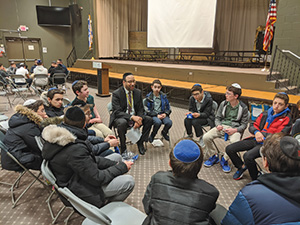


Eighth grade students from Ben Porat Yosef, Rosenbaum Yeshiva of North Jersey, The Moriah School, Yavneh Academy, Yeshivat He’Atid and Yeshivat Noam gathered together on January 7, Asara b’Tevet, for a technology awareness event run by Screening Our Future, the Bergen County initiative introduced in September to reset the way our children approach technology.
The girls assembled at The Moriah School and the boys at Ben Porat Yosef where they were shown the acclaimed documentary “Screenagers.” Screening Our Future featured the documentary in November to more than 1,000 parents, many of whom found it to be extremely eye-opening and suggested showing it to the students as well.
Prior to the film, Rabbi Beni Krohn of The Young Israel of Teaneck and Rabbi Yaakov Glasser of The Young Israel of Passaic-Clifton and The David Mitzner Dean of the Center For The Jewish Future and University Life at Yeshiva University offered inspirational thoughts to the girls and boys respectively, reminding them how important it is to be mindful of how they use technology.
“While our school already confronts the topic of technology use and overuse in our technology classes, the joining together of all the schools demonstrated to our students first-hand that this is an issue we all face and it is important enough for us to take the time to unite to figure out solutions,” said Aliza Frohlich, director of guidance in middle school at Yavneh Academy.
The film depicts a society of parents desperate to figure out ways to help kids keep control of their screens instead of screens controlling them. Concerns presented in the documentary mimic the increasing number of emails and phone calls received throughout the past year, leading to the development of Screening Our Future. Since its debut, Screening Our Future has received overwhelmingly positive feedback, indicating that parents really want guidelines for their children who are using technology. As is evident in the documentary, achieving the correct level of balance seems to be the ultimate solution everyone is searching for.
Following the film, students broke into small discussion groups led by guidance counselors and facilitators from the participating schools. Students were given a chance to openly discuss their thoughts and opinions about how they use technology and also understand that other kids their age face similar challenges. Some confided that their phone could be addictive and often interferes with schoolwork. Others described situations where kids are left out of group chats or events such as parties and get togethers.
What seemed most shocking was how many of the students claimed to have little or no limitations on cell phone usage, some revealing that they are on their phones late into the night. Furthermore, it was apparent that many parents have yet to install parental controls and are not regularly checking content and activity on their child’s device.
“In order to facilitate change, parents must partner with us to implement and enforce the guidelines suggested when we first introduced this initiative,” said Rabbi Price, head of school at RYNJ. These include no phones prior to sixth grade, install parental controls, set daily limits on screen time and lead by example.
According to Rabbi Chaim Hagler, head of school at Yeshivat Noam, we should be teaching our children to be kinder online and help minimize the damage that their various chat groups are causing. He added that conversations surrounding vacations, parties or expensive purchases create a toxic environment and should be discouraged.
Joining together to dedicate the morning to technology awareness provided a sense of camaraderie for the students and faculty alike. “It is such a crucial and prevalent topic, and to know that the yeshivot in Bergen County are coming together to address how social media is affecting our children is something that I am really proud to be a part of,” said Yardena Brickman, guidance counselor at The Moriah School.
Brickman led a session for girls and said it is clear that no matter what religious, social or educational background our children come from, they are all grappling with similar pressures surrounding social media.
For the most part the students liked the film, yet many said they didn’t identify with it on a personal level, suggesting the documentary focused on what they consider extreme cases. Many felt that engaging in conversation, especially with eighth graders from other schools, was helpful and allowed them to not only share their experiences but hear what their contemporaries are thinking as well.
Heather Hagler, school psychologist for middle school girls at RYNJ, saw tremendous value in gathering all the students together for an event like this. “Joining with eighth graders from other schools really helped the students recognize that finding a balance of the benefits of screen time and not falling into the trap of becoming distracted by it is an issue that we all work on,” she noted.
The students left their sessions with new ideas and convenient pouches to store their phones when taking a break from technology.
Heads of school of the six yeshivot that collaborated on this program are urging parents to partner with them to facilitate change. It is imperative to be regimented with our children about behaviors that will likely become even harder to control as technology continues to root itself in everyday life.
Screening Our Future plans to present programs to the sixth and seventh graders over the coming months. For more information about this event or Screening Our Future, please email headsofschoolnj@gmail.com.
By Andrea Nissel










